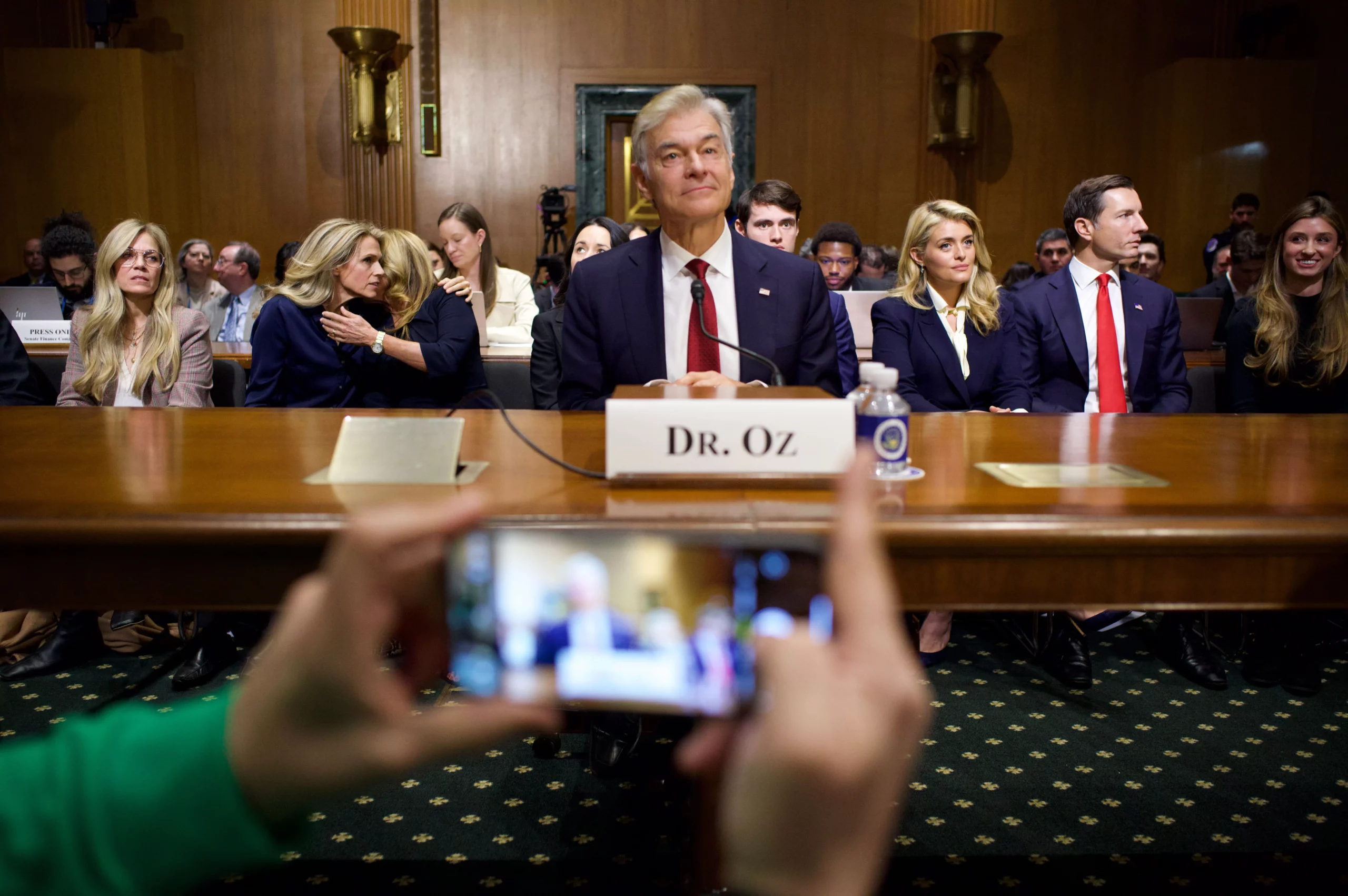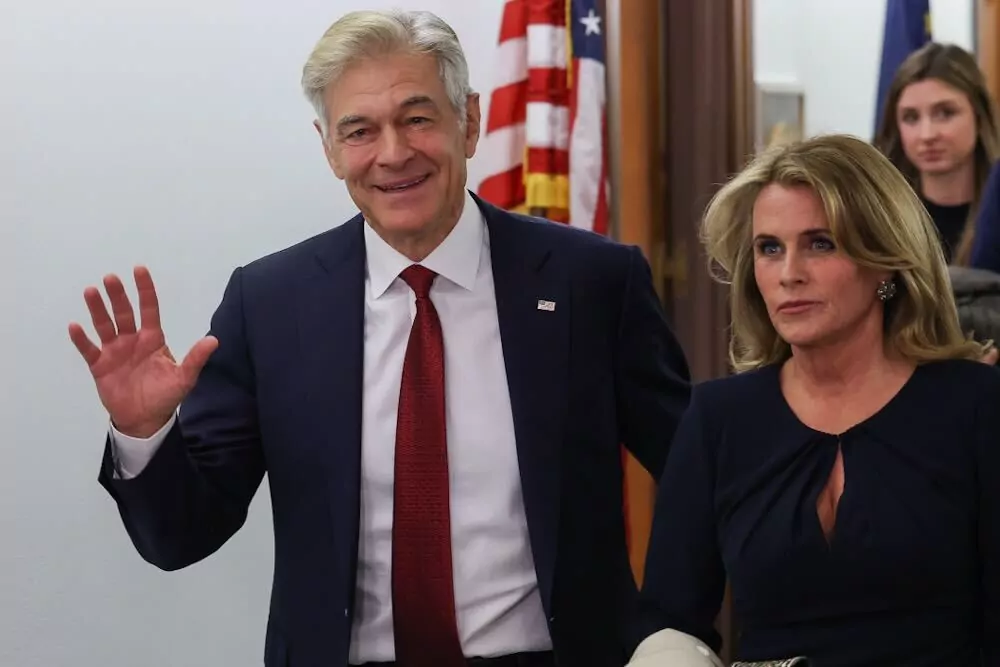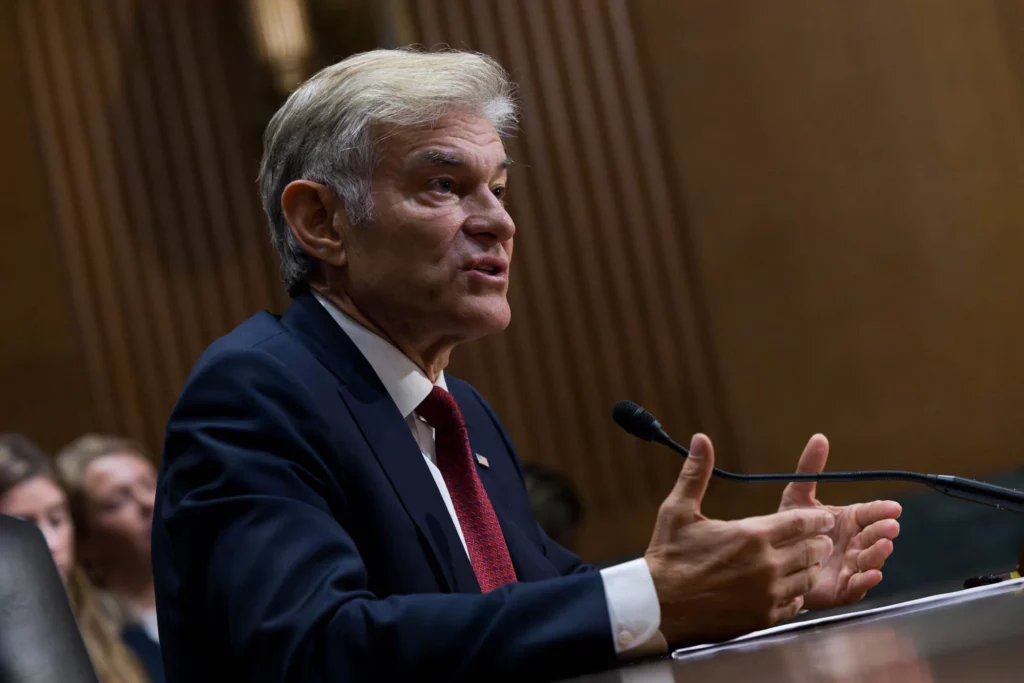Dr. Mehmet Oz, President Donald Trump’s nominee to run the Centers for Medicare and Medicaid Services, endured nearly three hours of questioning from the Senate Finance Committee on Friday, with most of the questions focusing on Republican plans to reform Medicaid programs.
CMS is the largest payer for healthcare in the United States, covering more than 160 million through Medicare, Medicaid, the Children’s Health Insurance Program, and the Obamacare health insurance marketplace.
Oz, a former Columbia University cardiothoracic surgeon and a prominent television personality, cultivated a strong relationship with Trump during his 2022 failed Senate campaign for Pennsylvania against liberal Sen. John Fetterman (D-PA).
Oz’s loss in the race was referenced by Republicans as providential, with several saying that he would be more impactful at CMS than as a legislator.
In the days before the hearing, Democrats on the finance committee circulated a memo alleging that Oz had used a loophole to avoid paying Medicare and Social Security taxes to the tune of $440,000 over the last three years.
Aside from one mention in the opening statement from the leading Democrat, Sen. Ron Wyden (D-WA), Oz’s financial disclosures did not take center stage during the questioning.
The hearing was largely amiable on both sides of the aisle, with Oz committing to traveling with Democrat senators to areas where patients dependent on coverage through CMS programs are struggling.
Oz presented a tone of optimism in reforming CMS, saying he would not only make it more transparent and efficient but also give the 7,000 employees and the 40,000 contractors that work with the agency the pride that comes with fulfilling an important role in serving the most vulnerable.
“Our biggest enemy is nihilism, is a lack of hope that we can fix what’s going on at CMS,” Oz said. “I am very confident, and I do believe that we have a generational opportunity to seismically shift the way we deliver healthcare services.”
Here are the highlights from the nearly three hours of testimony.

Republican Medicaid cuts
Democrats on the committee were laser-focused on impending Medicaid spending cuts to cover the cost of Trump’s promised tax cuts.
Last month, the House passed a budget resolution that slashed spending from the Energy and Commerce Committee’s jurisdiction by $880 billion. Analysts say that the bulk of the cuts would have to come from Medicaid.
“If confirmed, Dr. Oz is going to be responsible for executing whatever destruction is brought down on the Medicaid program Republicans are preparing to make,” said Wyden.
Oz said in his opening statement that Trump “wants to love and cherish Medicare and Medicaid, because he believes every American should get the care they want, need and deserve.”
He also said that he cherishes Medicaid, having worked with Medicaid patients while practicing at Columbia University prior to his television career. But he also stressed the need to maintain the solvency of the program.
“The way you protect Medicaid is by making sure that it’s viable at every level, which includes having enough to afford the services, paying them enough to do what you request them,” Oz said.
Sen. Maggie Hassan (D-NH) questioned Oz aggressively on the cuts to Medicaid, specifically the loss of coverage for children.
“How many children losing health insurance would be acceptable to you?” asked Hassan.
“I don’t want children losing insurance,” said Oz.
“Well, then you’re going to need to reject the Republican budget plan,” Hassan replied.

Medicaid work requirements
Senators on both sides of the aisle quizzed Oz on the viability of Medicaid work requirements, a popular reform policy intended to get able-bodied adults without children that are on Medicaid onto employer health insurance programs.
Only about 8% of adults on the Medicaid program between 18 and 64 who are not disabled or on Medicare do not work, according to the left-leaning think tank KFF.
When asking Oz about his support for Medicaid work requirements, Sen. Thom Tillis (R-NC) acknowledged that work requirements would only apply to “a single-digit portion of the population.”
“We’re not talking about sick people. We’re not talking about people with a diagnosed behavioral health problem,” said Tillis. “We’re talking about people that we do want to provide Medicaid for if they can’t afford it, but work so that they actually get the benefit and the freedom that comes from a job.”
Sen. Raphael Warnock (D-GA) highlighted for Oz that work requirements, as implemented in Georgia, create paperwork hurdles for patients that make accessing care more challenging.
Oz stressed the value of getting able-bodied adults into the workforce but agreed to compromise on the need to improve the bureaucratic hoops.
“These are the opportunities we have to make the system better. If we both agree that people should be trying to get off Medicaid, if they can, we should be able to create a system where we can track that,” said Oz.
Nursing home rule
The shortage of nurses also played a critical role in the hearing, particularly with respect to a minimum staffing requirement rule issued by the Biden administration’s CMS in 2023.
The rule requires facilities to provide 0.55 hours per day of skilled nursing care from a registered nurse and 2.45 hours per day from a nurse’s aide to assist with patients’ daily needs. Nearly three-quarters of all nursing homes would need to hire more staff to meet these requirements, exacerbating the nursing shortage.
Sen. James Lankford (R-OK) expressed concern that the rule would close rural nursing home facilities due to the lack of nurses to meet staffing requirements under the rule.
Sen. Catherine Cortez Masto (D-NV) said that cuts to Medicaid in the Republican budget would threaten nursing home access more than the Biden-era rule.
“Cutting Medicaid the way that my colleagues and Republican leadership want to do, which they are proposing, would also close nursing homes in rural America, including in Nevada, it would close hospitals, and it would close clinics,” Cortez-Masto said.
Oz said that arguments on both sides are “thoughtful ones that deserve more attention” and that it will be “one of the earlier things I focus on.”
“It’s an issue that I have spoken about with community groups quite a bit in preparation for this meeting,” Oz said.

Medicare drug price negotiation
The provision of former President Joe Biden’s Inflation Reduction Act that allows for CMS to directly negotiate prescription drug prices directly with pharmaceutical companies was mentioned only very briefly in the hearing, but the issue will likely be a defining piece of the Trump healthcare agenda.
The drug price negotiation program, which critics argue is tantamount to government price controls, is designed to lower the prices of the most costly prescriptions to the Medicare program.
When asked if Oz would defend the program against litigation from pharmaceutical companies against the provision in the IRA, Oz affirmed that he would “defend it and use it.”
But Oz was less direct when asked if he would continue the process of the drug price negotiation program started by the Biden administration.
“I’m going to look, as the president has instructed me, at every single way we can reduce drug prices, or options available,” said Oz.
Abortion and Medicaid
Sen. Steve Daines (R-MT) asked Oz about specific Biden-era provisions that allowed Medicaid to pay for abortion-related travel and other expenses following the overturning of Roe v. Wade.
“President Biden took several actions during his term to expand abortion access and travel for abortion using taxpayer dollars in many ways, including through the Medicaid program, which is explicitly in violation of the Hyde Amendment,” Daines said. “Let me say it even more clearly, it’s in violation of the law.”
FULL LIST OF EXECUTIVE ORDERS, ACTIONS, AND PROCLAMATIONS TRUMP HAS MADE AS PRESIDENT
Oz responded that “the Hyde Amendment has been around for a long time, and CMS should obey the rule and fund accordingly.”
The Supreme Court is set to hear oral arguments in a case next month as to whether or not South Carolina can prohibit state Medicaid dollars from funding Planned Parenthood and other abortion providers.














